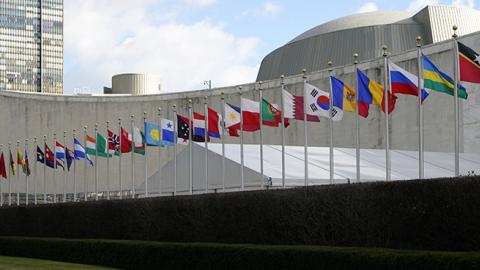World leaders meeting this week in New York for the UN General Assembly are a diverse crowd, including allies and partners as well as adversaries and competitors.
One thing many will have in common will be a lack of understanding of the Trump administration’s view of the world — of what makes the administration tick on foreign policy.
In Washington’s extraordinarily contentious environment, attention has focused on the controversies surrounding President Trump’s personality while obscuring important transformations in global affairs. Defining these changes and what they mean for the United States are key goals of the administration’s national security strategy, which, actually, has more bipartisan support than most people think, or care to admit.
The administration understands the world not as a community of nations with universally shared norms and values but as an arena where sovereign states align — or clash — in pursuit of national interests. It recognizes that sovereignty is the basis of interactions among states and is fundamental to the character of conflict and comity. This is not a new insight. The UN charter, after all, states that the organization is based on the sovereign equality of its members.
For decades, however, sovereignty has increasingly been subordinated to a global cooperative ideal. Yet globalization has not fulfilled the promise its advocates had hoped for and has, in many respects, exacerbated income inequality, contributed to severe immigration crises across the West and has been unable to moderate the behavior of states like Iran.
Recognizing these facts, the administration has opened a conversation on sovereignty and the degree to which individual states pursuing their national interests are best suited to solve persistent problems. It is a critical debate — one that’s engaged Democrats and Republicans alike, as well as leaders around the world. It is also a particularly relevant question as states continue to face territorial challenges to their sovereignty, in addition to new challenges like disinformation and foreign influence campaigns.
The administration seeks to give the nation-state the proper role in defending an order that will benefit a community of democratic states. Its strategy starts by recognizing that the world is inherently competitive and that the US and other democracies face economic, military and political challenges, all accelerated by technology.
Central to this competition are China and Russia, which present the most pressing threat to the security and way of life of the United States and those countries that value economic and political liberty. Many on both sides of the aisle recognize the challenges posed by authoritarian actors.
This is why a bipartisan group of leaders supported tough sanctions against Russia; increased defense spending to preserve American military strength and deterrent capabilities; and are considering ways to improve the ability of American businesses to invest overseas, thereby expanding US influence.
As the administration’s national security strategy points out, there is no unalterable arc of history ensuring that developments will favor free and open systems. This realistic approach includes cooperation with allies and partners — and even with adversaries on projects of mutual benefit.
Avenues for diplomacy remain open, and the president has maintained dialogues with leaders of all powers. But as President Trump has made abundantly clear, enduring cooperation must entail long-lasting reciprocal benefits, and, thus, US partners must share the burdens and responsibilities of ensuring our societies remain free and open.
Ultimately, successful competition and cooperation depend on confidence in what the United States and other democratic states have to offer. The United States does not seek vassals, but strong and capable partners. We should not and cannot impose our values on other societies. Promoting liberty by force is illiberal and doomed to failure. But using a full range of its economic and political instruments, America can continue to be the catalyst for positive developments in key regions.
Recognizing the forces that animate relations between nations is not cynical: It is clarifying and refreshing. It allows us to think clearly about restoring fair and reciprocal trade relationships; protecting our open systems from manipulation; and understanding the vital importance of defending and strengthening free societies.
UN General Assembly members who share American values and interests can work with the United States to strengthen and grow a community of free and open states.

















